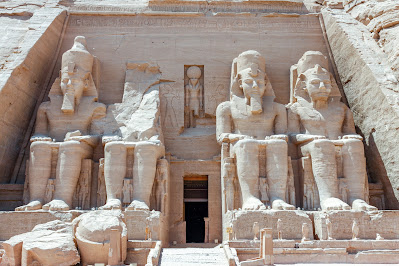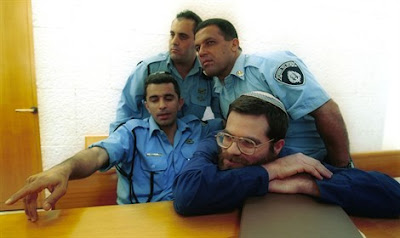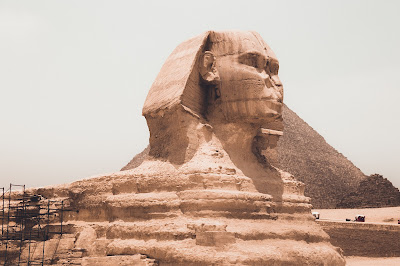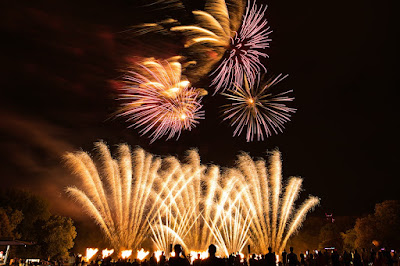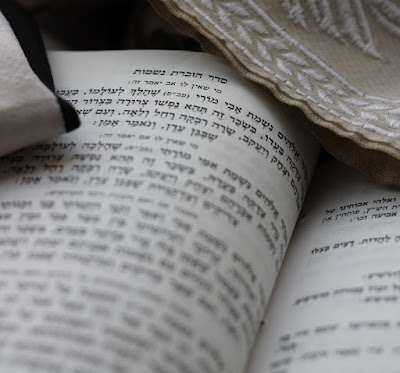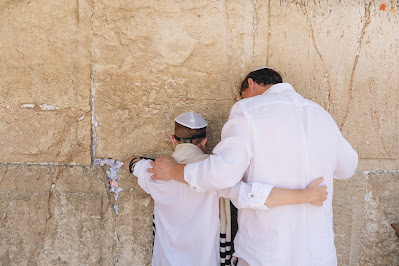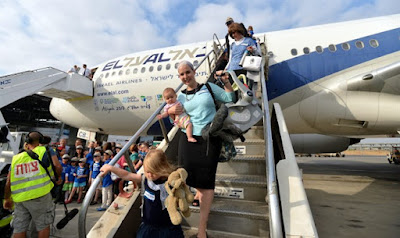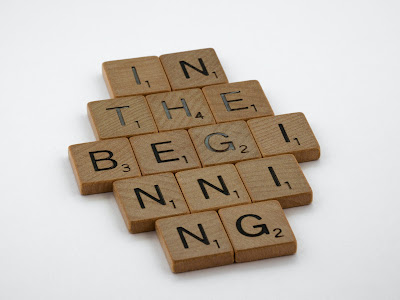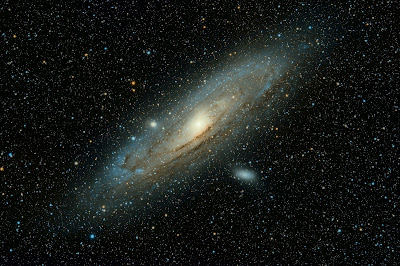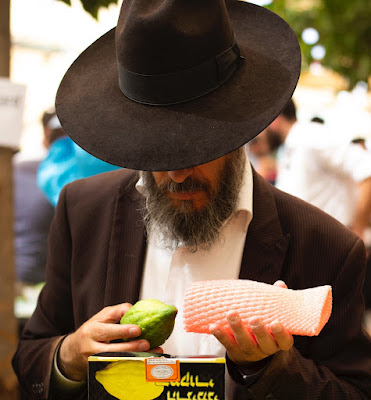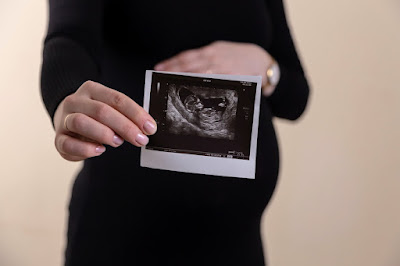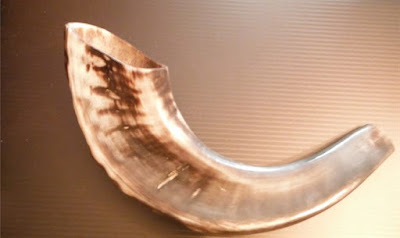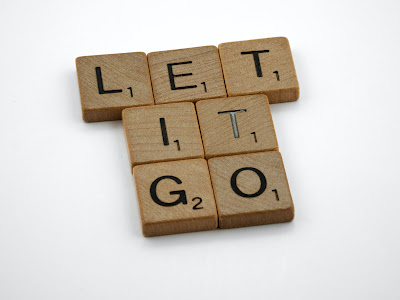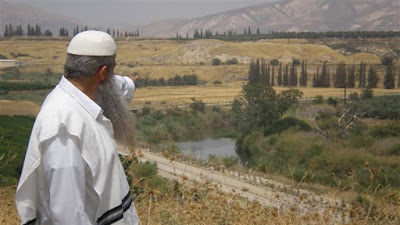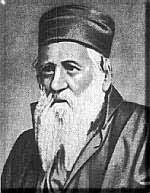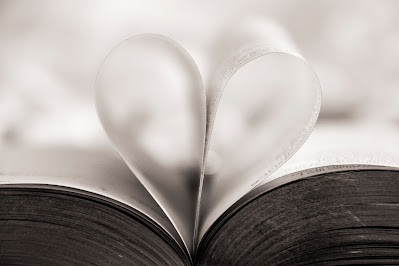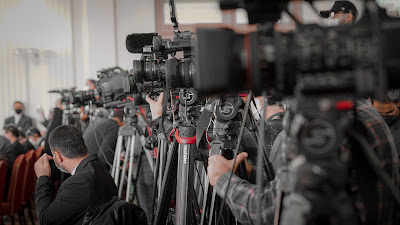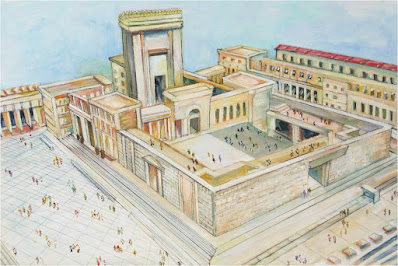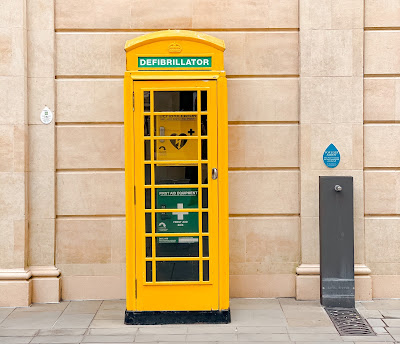Q. I am currently a student in a Hesder yeshiva [combining advanced Torah study with IDF military service], trying to build in myself a strong faith-based outlook. I hear many classes from various rabbis and read various books, but have still not found an answer to the question that is bothering me. It is this: Isn't it simply "convenient" for us to believe that there is something above and beyond the material world? It is not just "convenient" to believe that there is a G-d Who sees everything and thus gives meaning to life? Could it be that it is just this "convenience" that causes us to believe in G-d? We see, for example, that many of those who become religiously observant were looking for meaning in their lives, and "found" it in their faith in G-d.
Weekly Torah insights in the spirit of the teachings of Rav Kook, including video divrei Torah, Parshat HaShavua, Ask the Rabbi Q&As, and short clips of filmed classes
Thursday, December 29, 2022
Vayigash: Monotheism Even in Ancient Egypt!
by Rav Yosef Carmel, translated by Hillel Fendel
Before Yaakov Avinu (Patriarch Jacob) leaves the Holy Land for the last time and descends to Egypt with his family, G-d appears to him "in the visions of the night [and says to him]: Yaakov, Yaakov… I am the Lord, the G-d of your father; do not fear to descend to Egypt, for I will make you a great nation there. I will descend with you to Egypt, and I will certainly raise you up, and Yosef will place his hand on your eyes" (B'reshit 46,2-4).
The final phrase in that verse is somewhat enigmatic, and has been explained in various ways.
Thursday, December 22, 2022
Light from Within: An Ordinary Jew Who Killed a Terrorist
by Ronit Segev
The first English-language interview with Yoram Skolnik since his release from prison nearly 22 years ago.
His pure faith overcame a darkness that drives many to despair.
JUDEAN HILLS - It was Hanukkah. Which year, he can't remember - it was the late nineties in Israel - but the place he remembers all too well, and day after day he would pray that G-d would take him out of there and that some Hanukkah, some year, he would be able to rejoin his wife and little girl and light candles together, sing Hallel, play dreidel games, and enjoy latkes. But for now, thick walls separated them from him, and the people surrounding him were inmates and guards. He had been sentenced to Life.
Yoram Skolnik had requested a hanukkiyah in order to fulfill the mitzvah of the holiday, but prison officials had refused. In Hebrew, there is a word for the reason: staam. A reason that is no reason. Caprice. Officially, they said they feared he might make a bomb out of the candles. A bomb? Come on. The assertion was ridiculous and everyone knew it, but time after time the authorities wielded their power against religious inmates, particularly this one. They told him to build a hannukiyah by hollowing out potatoes, filling them with vegetable oil, and using scraps of linen as wicks. Yoram was incredulous and angry. This was Israel, the land of the Jews! And he'd have to make a hanukkiyah as Jews were forced to in the camps in Poland?
Miketz: Yaakov Is the Fire & Yosef Is the Flame
By Rav Yossi Weitzen, translated by Hillel Fendel
The Midrash tells us that both Yosef – the main character in this week's Torah portion of Miketz – and his father Yaakov Avinu were great tzaddikim (righteous men), and that they were also similar in many other ways. For instance, they were both born circumcised; their mothers were both barren for a long while, and ended up both bearing two sons; they were both shepherds; their brother(s) sought to kill each of them; they were both blessed with ten blessings; they both left the Holy Land and went to Egypt; both were built up via a dream; their fathers-in-law were both blessed in their merit; they both helped end a famine (see below); they both died in Egypt; the bones of each were returned to the Holy Land.
It is interesting to note that all the above likenesses have nothing to do with the respective characters of Yaakov and Yosef, but only to various things that G-d caused to happen to them. But let us ask: Is there also a similarity between the ways they responded to the various challenges they each faced?
Thursday, December 15, 2022
Vayeshev: On the Light of Hanuka and Israeli Independence
by Rav Yosef Carmel, translated by Hillel Fendel
Are the Hanukah miracles of 2,000 years ago relevant to our generation? The answer is: Yes, more than ever before!
Why is that? Let us begin the explanation at the beginning – from the first book of the Pentateuch. When Yosef was sold into servitude, he was taken out of the Land of Israel and brought down to Egypt. We can say that this marked the beginning of the exile of the Jewish People. For after Yosef became viceroy of Egypt, his brothers "followed" him there, and ended up remaining there – they and their descendants – for over 230 years, until the miraculous Exodus. Yosef's descent to Egypt began the long torturous path of his people, and rendered them totally dependent on others.
Thursday, December 8, 2022
19th of Kislev: In the Merit of the Land of Israel
by Rav Yitzchak Ginzberg, translated by Hillel Fendel
Two and a quarter centuries ago, on the 19th of Kislev 5559 [1798], the founder of Chabad-Lubavitch, Rabbi Schneur Zalman of Liadi (the Admor HaZaken), was freed from his imprisonment in czarist Russia. He had been incarcerated because certain "objectors" (misnagdim) to Hassidut had falsely libeled him to the Czar. When he was freed, the Rebbe realized that more than just a personal liberation, this event was a spiritual struggle – the result of objections to his dissemination of the "inner Torah of Hassidut." This meant to him that his release was the victory of Hassidut and a Heavenly sign and instruction that he must continue to disseminate the light even more strongly.
Vayishlah: Guarding the Honor of Israel
by Rav Zalman Baruch Melamed, translated by Hillel Fendel
Some people ask if it is permitted to endanger oneself for the sake of the honor of the People of Israel. It seems from this week's Torah portion that the answer is yes.
Q&A: How can I trust the transmission of the Torah?
Q. I have been bothered for a long time by a question of faith that I have not found discussed by any of the Rishonim [the medieval-period early commentators]. I am a religious person, with no doubts about the existence of the Creator or the concept of Reward and Punishment, both of which are necessitated by logic. I also believe in the World to Come. But what mainly bothers me is how our traditions were transmitted. Our faith is based on 600,000 adult males who saw with their own eyes and experienced receiving the Torah at Sinai, and transmitted this to the generations afterwards. Why shouldn't we say that, just like other peoples had folklore and legends that they believed, we also had such tales throughout the period of the Judges and First Temple, and that at the time of Ezra the Scribe, he gathered them all together into one book that we now call the Torah? After all, the Talmud says that during his time, parts of the Torah were forgotten and he reinstated them.
Thursday, December 1, 2022
Veyeitze: "How Awesome is This Place" – Beit El!
by Chaim Avihu Schwartz, translated by Hillel Fendel
Ever since the times of our holy forefathers Avraham, Yitzhak and Yaakov, the site and town of Beit El has been a central and sacred place. Here, in this holy spot, Yaakov Avinu dreams his famous Dream of the Ladder – and when he awakens, he says: "There actually is G-d in this place, and I did not know." He then continues: "How awesome is this place! This is none other than the House of G-d, and this is the gateway to the Heavens."
Q&A: How Can I Trust the Truth of Sinai?
Q. I'm a religious person, but of late the following issue has been bothering me: Our faith is based on the giving of the Torah at the Stand at Mt. Sinai. How do we know that Moshe Rabbeinu did not do some kind of magic of lights and pyrotechnics that caused the nation to believe that that's what happened? Today, too, we have great magicians who fool the audience into thinking what they want them to think – so surely 3,335 years ago, with a generation that basically believed in idol-worship, magicians could certainly fool people!
And secondly, what's this in the Book of Kings about King Hezkiyahu suddenly finding a Torah scroll and getting the nation to vow to observe everything written there? Perhaps everything began right then??
Thursday, November 24, 2022
Thursday, November 17, 2022
Q&A: Do Our Prayers Make a Difference?
Q. We know that the Torah teaches us that there is Reward and Punishment in this world for our deeds. We see this in many places: The stories of the Forefathers, in Genesis and elsewhere; the second paragraph of Kriyat Shema (Deut. 11) which states that if we follow the Torah we will receive rain for our crops, and that if we stray, the land will not give forth crops and we will be exiled; Moshe's speeches to the Nation warning what will happen if we do not keep our covenant with G-d or do not observe the Shemitah year commandments; and more.
Hayei Sarah: Sarah Lives On
by Rabbi Dov Berel Wein, RabbiWein.com
This week’s parsha records for us the passing of our father and mother, of Avraham and Sarah. The Torah notes these sad events without any undue display of emotion or even of great sadness. The Torah’s view of life is that death is inevitable and that death does not end the influence of life – in fact, it does not end life itself. The whole idea of the story of Yitzhak’s miraculous birth and his being saved from the altar of the akeida is to emphasize to us the continuation of life and generations in a family and in the Jewish people generally.
Thursday, November 10, 2022
Q&A: Is the Faith of Israel the Absolute True and Correct Faith?
Q. Every person finds himself at junctures in life, facing many possible paths to take, and he must choose one of them. If he is searching only for what is convenient and comfortable, then any of the choices could be appropriate – but if he is a man of truth, then only one road is the right one for him. For me, as someone searching for the truth of life, my question is: Is Judaism 100% correct? I have tested the Jewish faith from many angles – its tradition, its logical proofs, its prophecies – and they all seem to indicate that Judaism is the right approach. But is there even the smallest possible chance that I am mistaken? Could it be that the tradition was corrupted, or that the events in the Torah exaggerated? Could the proofs be incorrect because we have forgotten to include one detail in the equation? Could it be that the fulfillment of the prophecies is simply an amazing coincidence? I would like to know: Is the path of Judaism and its faith absolutely certain?
Thursday, November 3, 2022
Lekh Lekha: The Nature of the Land of Israel
by Rav Ezra Cohen, yeshiva.co, translated by Hillel Fendel
The first words of this week's Torah portion are replete with important meaning: "Lekh lekha, Go out from your land, from your birthplace, and from your father's house – to the Land that I will show you" (B'reshit 12,1). Many ask why the command is so lengthy and detailed. Rashi explains, based on the Midrash, that this is because the command is not an easy one to fulfill and Avraham is to receive reward for each word of it. Leaving one's country is hard, and leaving one's birthplace is harder still, and leaving one's parents' home – the house in which one played with his siblings and friends and grew up with his loving family – is the hardest of all.
Q&A: Will Redemption Come With or Without a Mashiah?
Q. Who will ingather our exiles to the Land of Israel – will it be G-d, or the Mashiah? What is the source that a person will ingather us?
Thursday, October 27, 2022
Noah: The Good, the Bad, and the Perfect Marriage
Noah: Preparing the Way for the Land of Israel
Thursday, October 20, 2022
Breishit: "The End Is Rooted in Its Beginning"
by Rav David Dov Levanon, yeshiva.co, translated by Hillel Fendel
The eternal connection between the Torah's final and first verses – in praise of Israel.
Thursday, October 13, 2022
Hoshana Rabba: Judgement or Joy?
By Rav Yair Vasserteil, yeshiva.co, translated by Hillel Fendel
How can Hoshana Rabba be a day of such happiness if it is actually a day of judgement?
Thursday, October 6, 2022
Sukkot: Let's Be Honest: We Won't Divide the Land
by Rabbi Zalman Baruch Melamed, translated by Hillel Fendel
Dateline: Erev Sukkot 1994, a year after the signing of the Oslo Accords
Thursday, September 29, 2022
Yom Kippur: Overcoming Self-Doubt & What Rachamim Really Means
By Rav Haggai Londin, translated by Hillel Fendel
The name of the game is not total victory, but constant progress.
Vayelekh: Who's Pulling the Strings?
by Rav Netanel Yosifun, translated by Hillel Fendel
This week's Torah portion reveals that the entirety of Jewish history, with all its uplifting joys and terrible hardships, was determined in advance.
Thursday, September 22, 2022
Rosh Hashana: The 4th Shofar of False Redemption
by Rav Meir Seidler, translated by Hillel Fendel
Back in 1934, Rav Kook delivered a famous speech in which he described the various motivations of Jews to return to Zion – and compared them to three different shofars. I would opine that today, a fourth shofar has been added, one that is actually dangerous for the process of the national return to their holy homeland, even as it is disguised by its proponents as part of the Redemption process.
Nitzavim: Connecting Teshuva & the Final Redemption
Rav Yaakov Moshe Harlop, a venerated student of Rav Kook and one of the heads of Yeshivat Merkaz HaRav after his teacher's death, often spoke of the contemporary phenomenon of baalei teshuvah, returnees to Torah observance. The problem was that this was far from a widespread trend at the time – 80 years ago, give or take – and his students wondered what he was referring to. On the contrary, it seemed that society in the Land of Israel was deteriorating towards secularism.
Wednesday, September 21, 2022
Struggling With the Fast of Gedalia
by Rav Yehuda HaKohen, VisionMag.org
Of all the Jews murdered throughout history, why should we fast for Gedalia ben-Aḥikam? There must be a reason beyond the assassination itself.
Thursday, September 15, 2022
Q&A: I'm Finding it Hard to Forgive
Q. What happens if someone does something bad to someone else, but the perpetrator cannot ask forgiveness (because the other one harmed him physically or verbally)?
Q&A: How Can I Request Forgiveness from Rabbis?
Q. Shalom. I am not religious. How can I ask forgiveness of rabbis to whom I related in a derogatory manner? I insulted and maligned them… and some of them are no longer living. Thank you. Sincerely, David
Ki Tavo: Gratitude for the Land of Israel
by Rav Moshe Tzuriel, yeshiva.co, translated by Hillel Fendel
This week's Torah portion of Ki Tavo begins with the words of appreciation that one must say when he brings his First Fruits to the Holy Temple: "I say today that I have come to the Land that G-d vowed to our Forefathers to give to us…" (D'varim 26,3).
Rashi explains that the purpose of this statement is to show that we are not ungrateful. Ungrateful for what? The Maharal of Prague, in his commentary on Rashi entitled Gur Aryeh, explains:
Thursday, September 8, 2022
Ki Tetzei: The Secret to Israel's Victory in War
By Rav Ariel Farajun, translated by Hillel Fendel
We may feel no legitimacy for those who fight HaShem's people – or else we can lose.
Tuesday, September 6, 2022
Our Torah’s Most Challenging Topics
Group discussion led by Rav Gavriel Reiss, VisionMag.org
Exploring some of the scarier areas of Israel's Torah might help us to find unexpected solutions to some of our generation's most formidable challenges.
Listen to the audio/read the transcript here (1h8m min)
Thursday, September 1, 2022
Elul in Our Generation of Redemption
by Rav Netanel Yosifun, yeshiva.org.il, translated by Hillel Fendel
A man once came to his rabbi with a complaint: "Rabbi, I work very hard and make hardly any money." The rabbi said, "I can give you a higher paying job, and it's also very easy work." The man jumped with joy and said, "I'll take it!"
The rabbi said, "Great. Take this hammer and swing it up and down, over and over at a set pace, and I'll pay you per hour." The man said, "Sounds both easy and profitable," and immediately got to work.
Shoftim: How to Join the Ranks of the Greatest People in History
by Rav Netanel Yosifun, yeshiva.org.il, translated by Hillel Fendel
A wise man once said: "The history of the world is actually the history of the great men of the world." He meant, of course, that the great people are those who move the historic processes and determine their countries' agenda.
Thursday, August 25, 2022
Elul: National Repentance - Returning to the Land
by Rav Yosef Carmel, yeshiva.co, translated by Hillel Fendel
Thursday, August 18, 2022
Ekev: The Mitzvah of Learning Hebrew
by Rabbi Moshe Ehrenreich, yeshiva.co, translated by Hillel Fendel
This week's Torah portion, Ekev (Deut. 7,12-11,26), features the second passage of our daily Kriyat Shema passage, which states: "You shall teach [the words of Torah] to your children, to speak of them, when you are at home and when you are on the way and when you lie down and when you get up" (ibid. 11,19).
Rashi cites the Midrash Sifri to this verse:
Thursday, August 11, 2022
VaEt'hanan: The Land of Israel Hidden in the 10 Commandments
by Rav Moshe Tzuriel, translated by Hillel Fendel
If all 613 commandments are included in the Ten Commandments ... where is the Land of Israel?
Tu B'Av: The Torah's Understanding of Love
by Rav Eli Scheinfeld, translated by Hillel Fendel
So much has been written over the course of history about the always-fascinating topic of Love. It encompasses many aspects of our lives, whether between parents and children, between G-d and mankind, between man and woman, or just simply various experiences in which we "love" to engage.
The Torah tells us to "love your friend as yourself" and to "love Hashem your G-d." It also relates that Yitzchak loved his wife Rivka, and that the two of them loved each of their sons, respectively. Yet, there is still much room to clarify what precisely is the Torah's approach to this issue.
Thursday, August 4, 2022
Tisha B'Av: Unleash the Torah's Shackles!
by Rav Netanel Yosifun, yeshiva.co.il, translated by Hillel Fendel
The fast of Tisha B'Av is approaching, and once again, it arouses within us very unpleasant sensations. The Sages taught that "debits [~ bad things] are 'rolled over' to days of indebtedness [~ bad days]" – and in fact, many calamities and troubles have happened on this day of the Ninth of Av.
And among the holy Jews, too, it appears that every individual connects to a different aspect of the general destruction – and there are many of them. One cries over the exile of the Jewish Nation from its land, while another moans over the destruction of the Holy Temple. One's heart is broken when he remembers the burning of the Torah, and his friend trembles at hearing of the horrors of the hunger and the travesties of the siege. One remembers the Crusades, another the Spanish Inquisition culminating in the Expulsion, and a third remembers the destruction of and expulsion from Gush Katif. Each Jew and his kinot (Tisha B'Av dirges)...
The source of all, however, is the destruction of the Holy Temple, and the rectification for all is its rebuilding. Everyone feels its lack in the way that touches him the most.
It is interesting that one particular deficiency humbly hid itself for many generations among the other things we lacked, finding its expression chiefly in allusions of the Sages of the Kabbalah. However, in our times, it appears to be peeking out and budding forth, gradually becoming a bitter, silent, but great cry.
The wise men of the secrets of the Torah arise at midnight to weep over the destruction as they recite the Tikkun Hatzot prayer, and in truth they focus in on one point: They cry over what Rav Kook calls "the giving over of the deepest secrets of the Torah to outside forces." The Torah parchments are burned, their letters fly off and upwards, and the Torah is simply not read and understood clearly among the people. Most people might feel that this is a great lack only for the most holy tzaddikim – but if we delve slightly deeper, we will find that each of us greatly feels this lack. To what am I referring?
We like to discuss and debate. So many symposiums and discussions are held in our nation on so many issues, some in public and some in private. The press, of course, loves to fuel these events, especially the discordant parts thereof; it is their bread and butter. All day long we hear many different angles of many different issues. Though some will say that we get to hear one side more than the other, we certainly know that each side gets to say its piece. What then is the problem?
The problem is not in how much coverage each side gets, but rather what questions are being discussed! What issues are on the public agenda? Individuals lucky enough to be in key media positions are the ones to decide these critical questions; they decide what's in the public interest to know, and what is less so. Thus, certain issues are not even brought up for debate!
Furthermore, even within the debates and discussions, there are generally many points that must be raised – but as we know, the journalists are often "running out of time," and therefore will choose only the angle they like. For instance, after a terrorist attack, they will often discuss exactly where the perpetrators entered, and they will quote the military figures promising to bring them to justice – but why don't they discuss the essential reasons for the enemies' hatred of us? Why don't they ask, "What profound steps – not necessarily military – must be taken in order to end the attacks?" By avoiding these issues, the debates and discussions lack true significance.
Our holy Torah has deep and important things to say, which have the ability to cure the national and individual crises we face. However, those who can bring these important messages are often silenced and muted, and thus the debates do not even truly begin.
I recall once speaking to a secular army buddy, and raising the possibility that a particular Torah scholar might be an appropriate candidate for Prime Minister. He looked at me in wonderment and said, "In the present climate, he has no chance in the world!" I then thought bitterly about the fact that the political atmosphere does not allow for men of true Torah vision to disseminate their ideas.
And thus, the letters of the Torah fly upwards, but here on Earth, they cannot be fully expressed. The Torah's hidden aspects remain hidden; the ability to reveal them is only in the hands of "outside" forces.
Similarly, when the Temple was destroyed, the Divine Presence left the Land, and the Torah was put on "mute." This, then, is what we're crying about on Tisha B'Av: that too often, when we feel an urge to share the greatness of Torah – no one listens because no one is permitted to say it. This is the tragedy of the destruction of Jerusalem!
This year, the date of the 9th of Av falls on Shabbat Hazon (trans. Sabbath of vision), while the fast itself is postponed until the day after. Let us pray that the Torah will be freed from its prison of silence, and the vision will once again be sounded and heard in completion – and the Redeemer will come to Zion!
Devarim: Making Aliyah Is a Matter of Willpower
by Rav Yosef Naveh, yeshiva.co.il, translated by Hillel Fendel
In this week's Torah portion, which we read every year just before the fast of Tisha B'Av, Moshe Rabbeinu reminds Israel that they "didn't want to" enter the Land of Israel, following the Sin of the Spies. Bnei Yisrael did not see it that way: "How can we go up [to the Land]?" they said, as if to say that it was not within their ability to do so.
It is told about the famous Reb Zusha that he was traveling with a Gentile wagon driver when suddenly the wagon, filled with hay, overturned. The Gentile asked Reb Zusha if he could help him gather the hay, and Reb Zusha replied, "I'm so sorry, but I cannot." The goy said, "You certainly can, but you just don't want to."
Thursday, July 28, 2022
Thursday, July 21, 2022
Matot: How Vows Are Like Idol-Worship
by several Rabanim, translated by Hillel Fendel
The beginning of this week's Torah portion of Matot focuses on certain important details pertaining to the laws of vows and oaths. A Torah-mandated oath is one by which one forbids himself to engage in one or more otherwise permitted activities.
This leads us to ask a very fundamental question:

